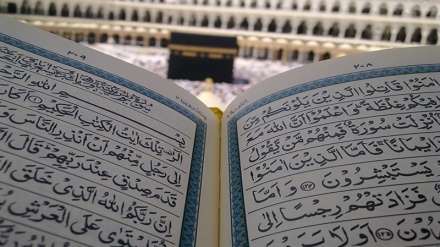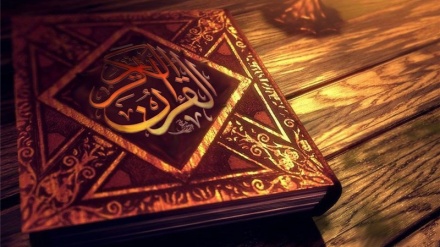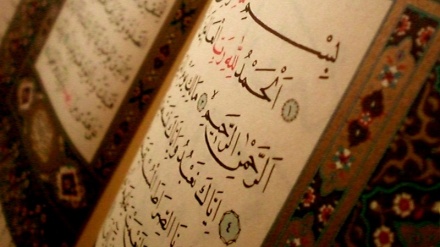Path towards Enlightenment (1028)
Welcome to our latest episode of “Path towards Enlightenment”, which is an endeavour to make you and us familiar with an easy and fluent explanation of God’s Final Scripture to all mankind, the holy Qur’an that was revealed to the Last and Greatest of all Messengers, Prophet Mohammad (blessings of God upon him and his progeny).
As you know, for the past few weeks we have been explaining “Surah Qalam” – the number 68 in the serial order of compilation of the holy Qur’an. Revealed in Mecca, it has 52 Ayahs and opens with a single discrete Arabic letter “Noon” and the Divine Oath by the instrument of “Qalam” or “The Pen”, as well as all knowledge that people are able to preserve and communicate thereby. It enumerates the noble characteristics of the Prophet of Islam and exhorts him to patience and steadfastness while rejecting the accusations of his foes who tried to mock him as insane. It exposes the vices of the enemies of Islam and referring to the inevitability of Resurrection and Final Judgement warns them of Divine Wrath.
A statement from the Prophet speaks of Divine rewards for those who recite Surah Qalam (regularly), while the Prophet’s 6th Infallible Heir, Imam Ja’far as-Sadeq (AS) says recitation of this Surah whether in the obligatory or supererogatory ritual prayers shall be immunity from the pressures of the grave for an observant Muslim.
We continue from where we left you last week and here are Ayahs 42 and 43:
“The day when the catastrophe occurs, and they are summoned to prostrate themselves, they will not be able (to do it).
“With a humbled look in their eyes, they will be overcast by abasement. Certainly they were summoned to prostrate themselves while they were yet sound.”
If you remember, in our previous edition of this programme we said one should be careful and cautious against being trapped in illusion and wishful thinking regarding any share of Paradise without having the necessary belief and inability to avoid sins or ever repenting of them. We also said that Allah’s Infinite Mercy is for those who rectify their wrong beliefs and repent of their sins, since the wealth and power of the world can neither buy rewards in afterlife nor avert the terrible punishment.
The Ayahs that we recited to you now refer to the situation of the disbelievers on the Day of Resurrection. They will be so scared that, according to an Arabic idiom, they will look as if their shanks are uncovered. It means that it is a very terrible situation and the inevitable catastrophe has occurred. In such conditions there is no use or benefits for regret.
Everyone shall be called to prostrate themselves and show humbleness before God Almighty on the Day of Resurrection. Believers will prostrate themselves, but disbelievers will be unable to do, since the vices deeply rooted in them in this world shall reveal themselves to impede them from prostration and salvation.
As Ayah 43 says, the eyes of the disbelievers will be cast down out of shame and regret, and they will be totally enwrapped in ignominy and disgrace. While alive and healthy they had refused to prostrate to God out of disbelief and arrogance, and now when they lack all bodily power their disobedience of Divine Commandments during worldly life will become fully evident on the Day of Resurrection, thereby preventing them from prostration and increasing their punishment.
These Ayahs teach us that:
- Those who disobey Divine Commandments, out of disbelief, wealth, power, and arrogance, will be so abjectly humiliated on the Day of Judgement that they won’t be able to even raise their head.
- On the Day of Judgement our deeds, whether good or bad, will become incarnated, and while believers prostrate on commandment, the disbelievers will be unable to do so.
- Our mortal life of the transient world should be spent in obedience of God’s commandments, and whatever wealth, powers, and soundness of health we should be at the service of the Creator and humanity.
Now let us listen to Ayahs 44 and 45 of the same Surah:
“So leave Me with those who deny this discourse; We will draw them imperceptibly [into ruin], whence they do not know.
“I will grant them respite, for my devising is indeed sure.”
These Ayahs mention how the Almighty Creator deals with the arrogant who will have no helper to save them from Divine punishment for their disbelief and the evil they had done by mocking at the mission of the Prophets and the heavenly scriptures – blasphemous acts that have brought destruction upon themselves.
As the next Ayah says, Almighty Allah does not hasten punishment but grants them respite in order to awaken their consciences for repentance, even though many of them continue their wicked ways on the assumption that the bounties and pleasures of worldly life they enjoy have made them immune from Divine punishment.
A hadith says that if a sin is committed, yet the unrepentant sinner continues to live in welfare and pleasure, this is the sign of him/her hurtling imperceptibly towards ruin and self-destruction.
From these Ayahs we learn that:
- The Holy Qur’an is the Revealed Word of the Almighty Creator and those who deny the Heavenly Scripture and the Prophet’s mission will definitely be subjected to painful punishment.
- The bounties which the sinners continue to enjoy despite their wicked ways and denial of truth, does not mean God favours them and excused them, while this is only a respite from the All-Merciful for repentance.
- None can save the disbelievers from the fire of Hell in the Hereafter.
In conclusion of this week’s episode of “Path towards Enlightenment” here are Ayahs 46 and 47 of Surah Qalam to further enlighten our souls:
“Do you ask them for a reward, so that they are weighed down with debt?
“Do they possess [access to] the Unseen so that they write it down?”
Two questions are posed here: First, has the Prophet asked any reward from the polytheists for his mission and they are not able to afford it? Second, do the polytheists have access to the Unseen which they write down and consider themselves needless of the Holy Qur’an?
The answers to these rhetorical questions are a big NO, since no prophet has ever asked the people to whom he preaches God’s message for any money or reward. Next, the claim or assumption of the disbelievers that they have access to the Unseen through soothsayers and certain texts, are totally false and meant to regard themselves equal or superior to the believers.
These Ayahs teach us the following points:
- Those who guide people and impart religious, spiritual, and ethical values to them should not ask them anything in return as salary or reward, but there is no harm in accepting reasonable presents.
- The knowledge of the Unseen is only known to the Almighty Creator and to those of His upright servants to whom He has revealed part of it, and definitely not to the soothsayers, fortune-tellers and those who claim to have dreams of coming events.
RM/AS/SS


